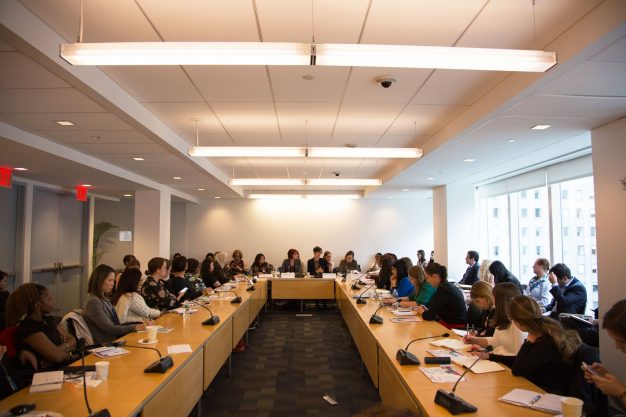Download the Press Release in PDF
NEW YORK, USA – On the occasion of the 59th Commission on the Status of Women (CSW), the panel discussion "Counterterrorism Measures and Their Effects on the Implementation of the WPS Agenda" took place on March 12, organized by the Women Peacemakers Program (WPP), Human Security Collective (HSC), Ecumenical Women’s Initiative (EWI) and WinG India. The panel discussion was hosted by the Permanent Mission of the Kingdom of the Netherlands to the UN in New York. The panel highlighted the impact of counterterrorism measures on women’s organizations, in particular women CSOs working for the implementation of the Women, Peace and Security (WPS) agenda. The sessions specifically addressed women activists’ growing concerns about the effects of restrictive financial regulations and legislative measures, which are rapidly shrinking an enabling space for civil society everywhere – and women’s critical civil society in particular.
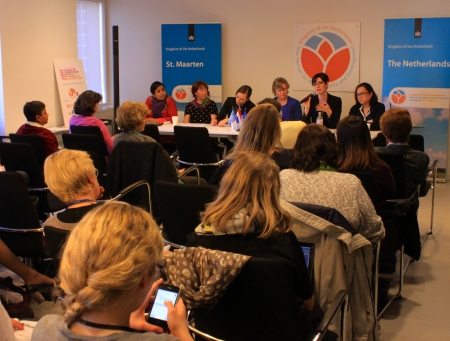 The rapid rise of counterterrorism measures (CTM) is presenting those concerned with implementing the WPS agenda with new challenges. It has brought an entirely new set of obstacles to women peace activists and organizations worldwide, which increasingly are being affected directly and indirectly. They are facing new restrictive legislative requirements, suffocating financial regulations, intimidating surveillance policies and exhaustive reporting requirements, all this in an already challenging environment. Fifteen years after United Nations Security Council Resolution 1325 was passed, women’s organizations not only struggle to translate this important document into a reality, they now also find themselves struggling to deal with the effects of a counterterrorism agenda that on the one hand labels women as important stakeholders in the fight against terrorism, yet on the other hand is rapidly shrinking the space in which these women so desperately need to operate.
The rapid rise of counterterrorism measures (CTM) is presenting those concerned with implementing the WPS agenda with new challenges. It has brought an entirely new set of obstacles to women peace activists and organizations worldwide, which increasingly are being affected directly and indirectly. They are facing new restrictive legislative requirements, suffocating financial regulations, intimidating surveillance policies and exhaustive reporting requirements, all this in an already challenging environment. Fifteen years after United Nations Security Council Resolution 1325 was passed, women’s organizations not only struggle to translate this important document into a reality, they now also find themselves struggling to deal with the effects of a counterterrorism agenda that on the one hand labels women as important stakeholders in the fight against terrorism, yet on the other hand is rapidly shrinking the space in which these women so desperately need to operate.
Karel van Oosterom, Permanent Representative of the Kingdom of the Netherlands to the UN in New York, remarked in his opening speech the importance of maintaining an enabling environment for women’s organizations, so that they can do their important work for peace, justice and development. He underlined that measures created to shrink terrorist space should not result in a limitation of human and women’s rights.
Lia van Broekhoven (HSC) opened the panel discussion, advocating for a stronger role for civil society in shaping counterterrorism policy. Civil society is a key stakeholder as they are an important actor in building peaceful societies – yet is also directly affected by these measures as CSOs are targeted specifically within the CTM framework. Based on HSC’s elaborate experience on the issue, she gave some examples of how CSOs can be effectively involved in policy development to counter these effects. Looking from a human rights perspective, Jayne Huckerby (Duke University School of Law) outlined the human rights challenges of counterterrorism strategies being directly equated with the WPS agenda, as this carries the risk of approaching women’s participation from an instrumentalist angle rather than a women’s rights agenda. Framed as such, this could even end up further putting women activists’ lives at risk, as it carries the risk that they – and their important work for peace on the ground - becomes perceived though a security lens and as closely tied to a foreign CTM agenda.
Next, several panellists shared their experiences in relation to the effects of counterterrorism measures on their work for women’s rights and WPS in particular. Isabelle Geuskens (WPP) highlighted: “Counterterrorism measures have increased the already vulnerable position of women’s peace organizations, e.g. via NGO bills that undermine a critical women’s civil society and banks that delay, limit or block the transfer of funds to women’s peace organizations. Not to mention the ever-increasing bureaucracy attached to donor’s transparency requirements, completely swallowing up already over-stretched women activists. This, in an environment that in itself is already unsupportive and risky enough. With UNSCR 1325 under review, raising awareness on the CTM effects on women’s work for peace is crucial. Otherwise, we might end up in the near future with a WPS agenda that looks good on paper, yet in reality we will be without an enabling space for women’s organizations to actually implement this agenda.”
Carolyn Tomasović Boyd (EWI), representing the perspective of women’s funds during her contribution, warned that counterterrorism measures are make supporting innovative, smaller women’s organizations increasingly difficult, with risks of them disappearing all together: “The issue of identifying resources for women is high on all of our agendas, but one issue not being talked about underlies them all. That is how counterterrorism measures are impacting women’s rights to access those resources already dedicated to her.”
Finally, Anjuman Ara Begum (WinG India) shared how grassroots women’s activists experience and deal with counterterrorism measures: “We constantly adopt different strategies to keep on doing our work. We have to be creative in continuing our gender and peace activist work, while simultaneously addressing the negative effects of counterterrorism measures.”
The panel discussion concluded with a list of key recommendations for civil society as well as policy makers and UN representatives. The speeches of the panellists, as well as a policy brief, will be made available soon via: www.womenpeacemakersprogram.org
END
List of Speakers:

Founded in 1997, the Women Peacemakers Program supports the participation of women in peace processes, and raises awareness on the importance of women’s inclusion in peacebuilding. During 2009-2010, WPP pioneered the pilot program “Overcoming Violence: Exploring Masculinities, Violence and Peacebuilding”; and since then incorporates a masculinities perspective in its work for gender-sensitive peacebuilding. During July 2014, WPP organized the Global Consultation “Gender and Militarism: Analyzing the Links to Strategize for Peace”. The Global Consultation brought together over 70 peace and human rights activists and academics, representing over 25 countries from all over the world, to discuss the multi-layered connections between gender and militarism. The consultation included an exploration of the effects of counterterrorism measures on women’s activism for peace and human rights across the globe.
www.womenpeacemakersprogram.org

HSC is a foundation with a strong background in Development, Conflict Transformation and Security. HSC connects local human security with global security, engages civil society with security agendas on conflict prevention and countering violent extremism. It enables governments to build meaningful and trustful engagement and partnership with civil society on security matters. HSC is a hub and facilitates a network of civil society leaders working on a broad spectrum of security related issues: women and youth leadership in high risk areas, a human security approach to counter violent extremism, and altering current agendas to prevent terrorism financing.
www.hscollective.org
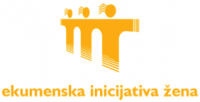
EWI is a Croatian-based regional women’s fund, which was established in 2007 and works in Bosnia & Herzegovina, Croatia, Kosovo, Macedonia, Montenegro and Serbia. EWI focuses on supporting women as initiators and agents of change in faith communities and in wider society, by supporting and connecting individuals and groups working in the fields of women’s rights; peacebuilding and reconciliation; and belief-based ecumenical and inter-religious dialogue & cooperation. Specifically, EWI supports the engagement of women activists in grassroots peace and women’s rights initiatives, while encouraging them to publically voice their ideas on religion and faith, peace and security through a women’s lens, affirming and placing their grassroots activism within the context of movement building. EWI’s Grantmaking Program awards grants to women-led NGOs and women theologians in the region. Through this Program, EWI seeks to empower and support them in recognizing their potential as change makers in society, who actively contribute to building a more just and free society. EWI is also a grantee of the Funding Leadership and Opportunities for Women Fund (Flow Fund 2012-2015) that has been set up by the Ministry of Foreign Affairs of the Netherlands to improve the position of women and girls in developing countries.
www.eiz.hr

Women in Governance – India (WinG-India) is a network of women human rights defenders (WHRDs) comprising Dalit women (erstwhile untouchables) and women affected by conflict in Northeast India and other parts of the country. The members of WinG-India represent marginalized communities across India and work towards promoting leadership within local governance. Since its formation in 2009 WinG-India has emerged as a strong network within civil society organizations in India working on issues of women’s security, peace and governance and is successful in bringing forth the subaltern voices at various national and international forums. The key focus area of WinG is women’s security (with a special focus on the implementation of UNSCR 1325), exploring customary laws and their impact on women’s lives. With the support of a small secretariat in New Delhi, WinG operates in India as a non-political, non-religious and non-violent independent network of women activists. All WinG members work on a voluntary basis.
www.wing-india.org
Duke University School of Law is an ambitious, forward-thinking, and innovative institution whose mission is to prepare students for responsible and productive lives in the legal profession. Duke Law provides an integrated approach to human rights education, advocacy and scholarship that places students at the intersection of human rights theory and practice, both domestically and abroad, including through its International Human Rights Clinic, that provides students with an opportunity to critically engage with human rights issues, strategies, tactics, institutions, and law in both domestic and international settings.
http://law.duke.edu/humanrights/
Hosted by the Permanent Mission of the Kingdom of the Netherlands to the UN
12 Dec '17 Today, we are pleased to share with you the Conference Report “Financial Inclusion for Freedom and Security” by the Women Peacemakers Program, Duke Law International Human Rights Clinic, Human Security Collective, Transnational Institute, the Charity & Security Network, in cooperation with the Knowledge Platform Security and Rule of Law.
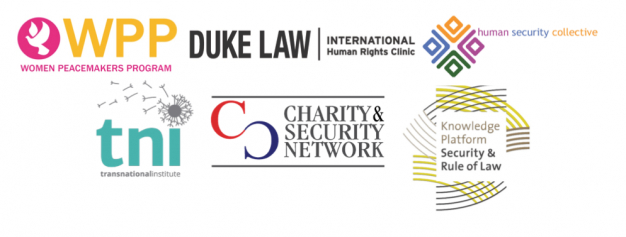
7 Dec '17 Today, on the 13th day of the 16 Days of Activism Against Gender Violence Campaign, we bring you the sad news that from 15 December onwards, the Women Peacemakers Program (WPP) will have to close its doors. We would like to ask for your time to read what has driven us to make this decision.
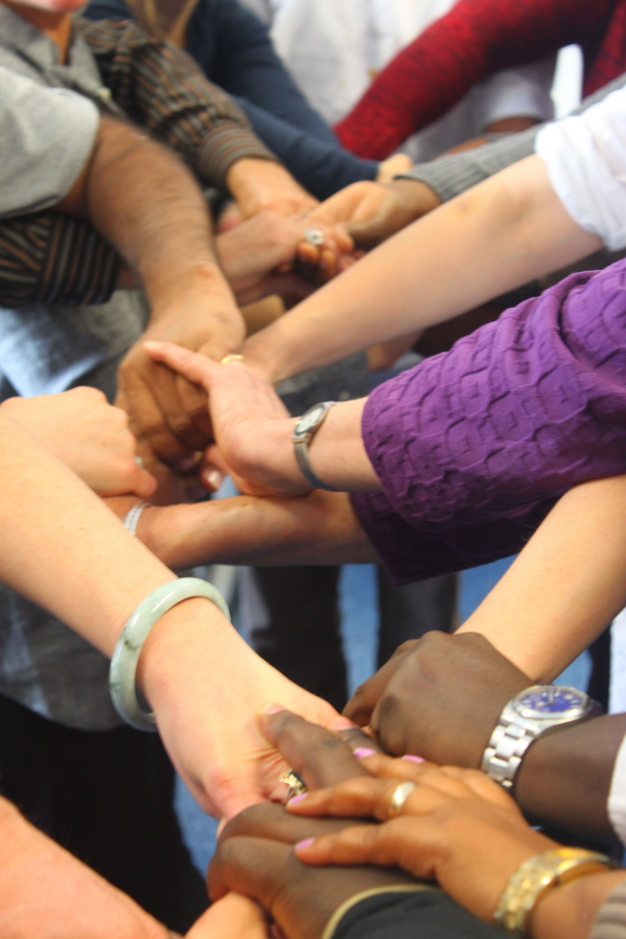
7 Nov '17 On Thursday, 26 October 2017, a side event entitled, “Pulling the Rug from Under Our Feet: What is the UNSCR 1325 Without Civil Society Freedoms?” was hosted on the margins of the 17th anniversary of United Nations Security Council Resolution (UNSCR) 1325. The event was hosted by the Women Peacemakers Program (WPP) and the Dutch Mission, in collaboration with Duke Law’s International Human Rights Clinic, Al-Hayat Center for Civil Society Development, Arab Women Organisation of Jordan, NOVACT, Free Sight Association, Iraqi Al-Amal Association, Women Empowerment Organisation, NGO Working Group on Women, Peace and Security and Women’s International League for Peace and Freedom. This article briefly looks at the main issues discussed during the event.
